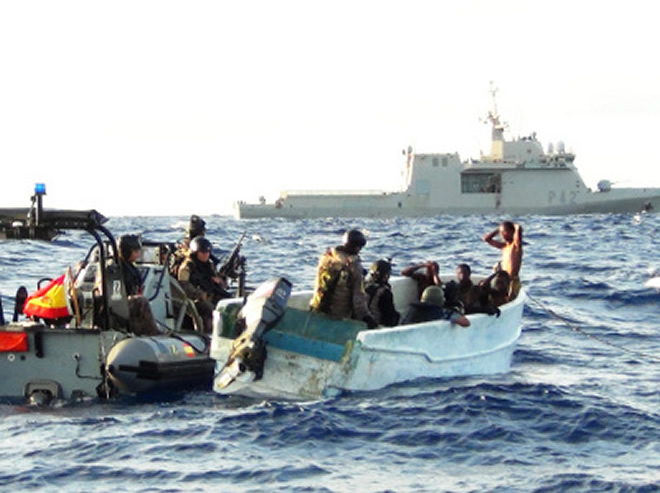

Friday, May 29, 2015
The three task forces of NATO Allied Maritime Command (MARCOM), together with allied forces, are helping Somali and neighbouring countries patrol their own waters as piracy incidents decrease following naval patrols and the adoption of best management practices. Nevertheless, anti-piracy patrol in the Gulf of Aden and Mozambique Channel continue.
“The efforts of all involved has seen not even one serious attack attempt since January 2014,” Vice Admiral Bruno Paulmier said, warning conditions that first caused the outbreak of piracy still exist.
“MARCOM is now focussing its efforts, in close co-ordination with CMF and EU NavFor on increasing Somali and neighbouring countries’ abilities to successfully patrol their own waters and deter piracy without outside assistance.
“There is still much to be done before that goal is achieved,” he said.
Paulmier made the remarks at a meeting in the United Kingdom attended by US Naval Force Central Command/US Fifth Fleet/Combined Maritime Forces (CMF), the European Union Naval Force Somalia (EU NavFor) and the United Kingdom Amphibious Forces. The meeting centred round maritime security and counter-piracy.
The three flag and general officers who attended represent operational command of the counter-piracy task forces CTF-151, headquartered in Bahrain; CTF-465, headquartered in Northwood, United Kingdom; and CTF-508, the NATO counter-piracy Operation Ocean Shield task force. The officers present were Vice Admiral John Miller, Major General Martin Smith and Paulmier.
Anti- and counter-piracy efforts of these three task forces are centred around the Gulf of Aden and the Horn of Africa.
South Africa is also aware of the threat posed by piracy and has deployed a naval asset in the Mozambique Channel to fight this threat in recent years. Speaking during her budget vote address in the National Assembly earlier this month, Defence and Military Veterans Minister Nosiviwe Mapisa-Nqakula said: “Maritime crime and piracy in Southern African Development Community (SADC) waters has necessitated maritime patrols on our east coast, while we remain mindful of similar challenges on the west coast (of Africa)”.
The South African anti-piracy effort – Operation Copper - is a SADC one along with Mozambique and was earlier this year extended until March next year by SA National Defence Force (SANDF) Commander-in-Chief President Jacob Zuma. He indicated the deployment of 220 SANDF members (mostly SA Navy with the SA Air Force and SA Military Health Service also contributing) would cost R127 027 773 until March 31, 2016.
In Moscow the Minister recently gave an insight into South Africa’s maritime security strategy to an international security conference.
“Maritime security,” she said, “is a key component of collective security, stability and peace, more so today, in a multi-polar world order. Our oceans encompass almost 70% of the earth's surface and carry more than 80% of global trade.
“All nations, whether coastal or landlocked, are to a greater or lesser extent dependent on the sea for the continued success of their economies and hence the well-being of their peoples. The freedom of nations to use the highways provided by the oceans to ply their trade to all the corners of the earth is the basis for this dependence.
“In the case of Africa, the importance of maritime trade for economic development and regional integration cannot be over-emphasised. About 90% of the total trade of our continent is seaborne. Ships remain the means to trade between continents and islands.
“Closer to home, in SADC, about 30% of the world oil supply passes through the Mozambique Channel annually. Consequently, the ability to trade, as well as the principle of the freedom of the seas, is central to any policy and planning of the security of the region.
“It was for this reason the continent and the SADC region recognised the rise in maritime insecurity around the Horn of Africa as a detriment to security of states as well as to the continent’s economy. In particular, piracy and maritime crime is negatively impacting on the economies of African states connected to the Indian Ocean as well as Indian Ocean Island States whose economies depend to a great extent on tourism.
“These aspects of maritime criminality include illegal fishing, plundering of maritime resources, illegal exploitation of minerals and hydrocarbons and the trafficking/smuggling of illegal goods, weapons, people and drugs. Piracy also targets hydrocarbons and natural gas exploration and drilling at sea. There have been instances where vessels carrying gas to Indian Ocean Island States have been hijacked, significantly impacting on the supply of gas.
“The nature of SADC maritime security and the costs of piracy today call for a comprehensive approach to this global challenge of maritime piracy which entails short and long term initiatives,” she told delegates to the Moscow conference.